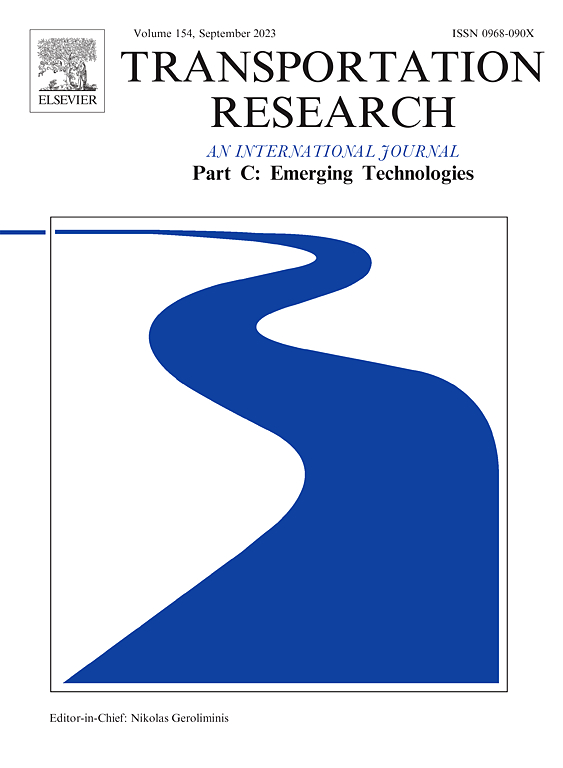Agentic Large Language Models for day-to-day route choices
IF 7.6
1区 工程技术
Q1 TRANSPORTATION SCIENCE & TECHNOLOGY
Transportation Research Part C-Emerging Technologies
Pub Date : 2025-09-06
DOI:10.1016/j.trc.2025.105307
引用次数: 0
Abstract
Understanding travelers’ route choices can help policymakers devise optimal operational and planning strategies for both normal and abnormal circumstances. However, existing choice modeling methods often rely on predefined assumptions and struggle to capture the dynamic and adaptive nature of travel behavior. Recently, Large Language Models (LLMs) have emerged as a promising alternative, demonstrating remarkable ability to replicate human-like behaviors across various fields. Despite this potential, their capacity to accurately simulate human route choice behavior in transportation contexts remains doubtful. To satisfy this curiosity, this paper investigates the potential of LLMs for route choice modeling by introducing an LLM-empowered agent, “LLMTraveler.” This agent integrates an LLM as its core, equipped with a memory system that learns from past experiences and makes decisions by balancing retrieved data and personality traits. The study systematically evaluates the LLMTraveler’s ability to replicate human-like decision-making through two stages of day-to-day (DTD) congestion games: (1) analyzing its route-switching behavior in single origin–destination (OD) pair scenarios, where it demonstrates patterns that align with laboratory data but cannot be fully captured by traditional models, and (2) testing its capacity to model adaptive learning behaviors in multi-OD scenarios on the Ortuzar and Willumsen (OW) network, producing results comparable to Multinomial Logit (MNL) and Reinforcement Learning (RL) models. Additionally, the study assesses lightweight, open-source LLMs, highlighting their effectiveness in route choice simulation and their potential as cost-effective alternatives to more advanced closed-source models. These experiments demonstrate that the framework can partially replicate human-like decision-making in route choice while providing natural language explanations for its decisions. This capability offers valuable insights for transportation policymaking, such as simulating traveler responses to new policies or changes in the network. The code for this paper is open-source and available at: https://github.com/georgewanglz2019/LLMTraveler.
日常路线选择的代理大型语言模型
了解旅行者的路线选择可以帮助决策者在正常和异常情况下制定最佳的运营和规划策略。然而,现有的选择建模方法往往依赖于预定义的假设,难以捕捉出行行为的动态和适应性。最近,大型语言模型(llm)作为一种很有前途的替代方案出现了,它展示了在各个领域复制类似人类行为的非凡能力。尽管有这种潜力,但它们在交通环境中准确模拟人类路线选择行为的能力仍然值得怀疑。为了满足这种好奇心,本文通过引入一个llm授权的代理“LLMTraveler”来研究llm在路线选择建模方面的潜力。该智能体以LLM为核心,配备了一个记忆系统,可以从过去的经验中学习,并通过平衡检索到的数据和个性特征来做出决策。该研究通过两个阶段的日常(DTD)拥堵游戏系统地评估了LLMTraveler复制人类决策的能力:(1)分析其在单起点-目的地(OD)对场景下的路由交换行为,其中它展示了与实验室数据一致但传统模型无法完全捕获的模式;(2)在Ortuzar和Willumsen (OW)网络上测试其在多起点场景下建模自适应学习行为的能力,产生可与多项式Logit (MNL)和强化学习(RL)模型相媲美的结果。此外,该研究还评估了轻量级的开源llm,强调了它们在路线选择模拟中的有效性,以及它们作为更先进的闭源模型的成本效益替代品的潜力。这些实验表明,该框架可以部分复制类似人类的路线选择决策,同时为其决策提供自然语言解释。该功能为交通政策制定提供了有价值的见解,例如模拟出行者对新政策或网络变化的反应。本文的代码是开源的,可从https://github.com/georgewanglz2019/LLMTraveler获得。
本文章由计算机程序翻译,如有差异,请以英文原文为准。
求助全文
约1分钟内获得全文
求助全文
来源期刊
CiteScore
15.80
自引率
12.00%
发文量
332
审稿时长
64 days
期刊介绍:
Transportation Research: Part C (TR_C) is dedicated to showcasing high-quality, scholarly research that delves into the development, applications, and implications of transportation systems and emerging technologies. Our focus lies not solely on individual technologies, but rather on their broader implications for the planning, design, operation, control, maintenance, and rehabilitation of transportation systems, services, and components. In essence, the intellectual core of the journal revolves around the transportation aspect rather than the technology itself. We actively encourage the integration of quantitative methods from diverse fields such as operations research, control systems, complex networks, computer science, and artificial intelligence. Join us in exploring the intersection of transportation systems and emerging technologies to drive innovation and progress in the field.

 求助内容:
求助内容: 应助结果提醒方式:
应助结果提醒方式:


